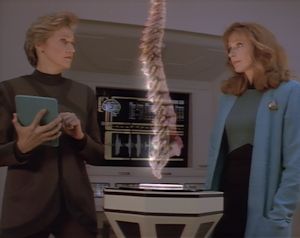| |||||||||||
| |||||||||||
|
Spoiler-free notes: I find it really hard to believe that La Forge, when playing poker, waits until the hand is over to peek at the cards. Then again, even if he does, he's still cheating to some extent. I understand you can't actually drop a heavy object on an actor, but they needed to do something to keep the canister from bouncing if they wanted us to accept the premise that this is a spine-crushing injury. Why is Dr. Crusher writing papers about cybernetic interfaces? If her experience de-assimilating Picard following "Best of Both Worlds, Part II" gave her new insight into the subject, wouldn't it have also reinforced the dangers of such technology? Maybe I'm not giving her enough credit, and maybe her paper is specifically about that danger. It is wise of Worf to turn to Riker for help in the hegh'bat ceremonial suicide. Of all the members of the crew, with the exception of Picard, Riker is the most likely to accept such a Klingon tradition. Riker, ever since his experience on the Pagh in "A Matter of Honor," has shown a certain fascination with, and intuitive understanding of, Klingon behavior. Given medical advances in stem cell technology in recent decades, the idea of the "genetronic replicator" seems awfully quaint and outdated, though you could just as easily call it prescient for its time. Nice reference to Marla Aster from "The Bonding." This would have been an appropriate time to bring back--or at least mention--Jeremy Aster, Marla's orphaned son and Worf's "blood brother." Should Riker really have left the knife sitting there on Worf's legs? He may be a parapalegic, but I'm sure he could still find a way to get to it if he were determined enough. I'm sure Riker is confident that Worf's desire to perform the hegh'bat honorably, with Alexander present, will win out, but still, just to be sure, wouldn't it be better to not leave the knife within his reach? Operating room drama isn't one of TNG's strengths. It's just as cheesy and nonsensical in this episode as it is in season 2's "Samaritan Snare." Worf's "unexpected" recovery due to Klingon synaptic redundancy (it's almost a deus ex machina) reminds me of how Spock overcomes blindness because of a vestigal eyelid at the end of the TOS episode "Operation: Annihilate!" On one hand, this episode does everything right. It is yet another way to explore the dichotomy that is Worf and offer him a choice between the human way and the Klingon way. It offers a chance to develop his character, as well as Riker's, Troi's, and Crusher's. It uses its story to discuss weighty real-world issues of assisted suicide, respect for seemingly abhorrent foreign traditions, basic medical ethics, and how to deal with a sudden disability. On the other hand, this is cheaply manipulative medical melodrama worthy of General Hospital. There's very little in the way of sci-fi here, and the dilemma is so obviously telegraphed and poorly executed that it can't maintain any proper suspension of disbelief. I've talked a lot lately about the show going too far in the soap opera direction, but this episode is by far the worst offender yet. Events in this episode are the catalyst for the Troi/Worf romance in the show's final season, as explained in "Parallels." | |||||||||||
|
| |||||||||||
| |||||||||||
|
Copyright ©2012 e. magill. All rights reserved.
|

